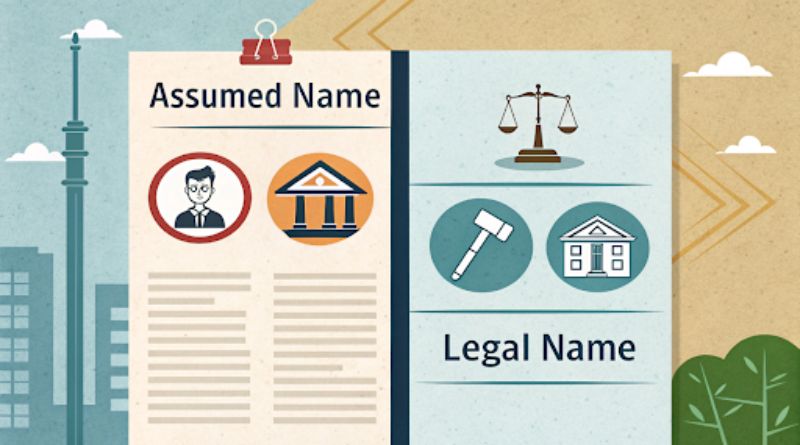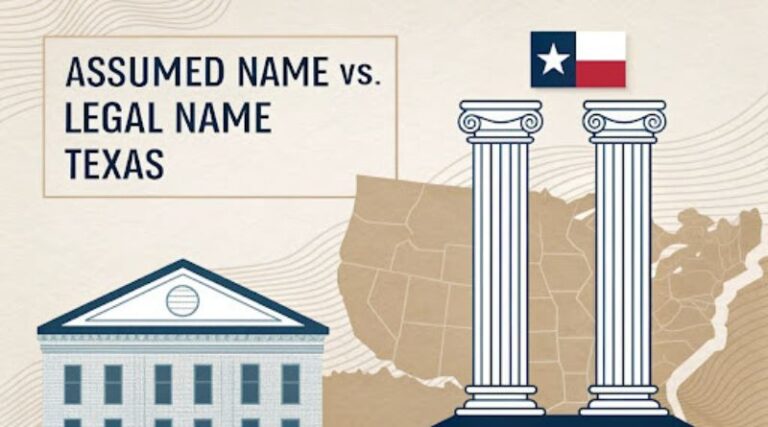Every business in Texas operates under a name that identifies it to the public and government authorities. However, many new entrepreneurs get confused between an assumed name (commonly called a DBA) and a legal name (the official registered business name). Both are crucial for branding, legal compliance, and tax reporting. Understanding their differences helps business owners avoid penalties, maintain professionalism, and operate smoothly within Texas law.
In Texas, your business’s legal name is the official identity registered with the Secretary of State or the county clerk, depending on your business type. The assumed name, on the other hand, is the trade name or brand name under which you conduct business publicly. Knowing how these two names differ — and when to file each ensures your company’s paperwork aligns with its branding strategy and state regulations.
Understanding Legal Name in Texas
The legal name of a business is the official name that appears on its formation documents, tax records, and government filings. For a sole proprietorship, the legal name is the owner’s personal name. For LLCs, corporations, and partnerships, it’s the name registered with the Texas Secretary of State. This name is what the state recognizes as your business’s true legal identity.
The legal name appears on contracts, bank accounts, and legal documents. It ensures that your business can enter agreements, pay taxes, and be held accountable under the law. When choosing a legal name, it must comply with Texas naming guidelines — meaning it cannot be identical or too similar to another registered business name and must include identifiers like “LLC,” “Inc.,” or “Ltd.” depending on the business structure.
What Is an Assumed Name in Texas
An assumed name (often called a “Doing Business As” or DBA) is any name your business uses that is different from its legal name. This is the name customers see on signs, websites, and advertisements. For example, if “Austin Marketing Solutions LLC” operates as “AMS Digital,” the latter is its assumed name. It allows flexibility for branding and marketing without forming a new business entity.
In Texas, an assumed name must be registered either with the Secretary of State (for entities formed with the state) or with the county clerk’s office where the business operates. This registration ensures transparency and helps the public identify the real owners behind a trade name. Failing to register your assumed name can lead to legal complications and even loss of credibility with banks or clients.
Key Differences Between Assumed Name and Legal Name
The most significant difference between an assumed name and a legal name lies in their purpose and recognition. The legal name is your business’s official title under Texas law, used for contracts, tax filings, and compliance. The assumed name, however, is a marketing name that may differ from the legal name to reflect a specific product line, service, or brand identity.

While the legal name must be unique at the state level, multiple businesses can technically share the same assumed name as long as they operate in different counties or industries. However, it’s smart to check availability before registration to prevent brand confusion. Using an assumed name doesn’t change your business’s legal status — it’s simply an alias under which your company operates publicly.
Why Businesses Use an Assumed Name in Texas
Businesses often adopt an assumed name to create a more memorable or descriptive brand. For example, “John Smith LLC” may not resonate with customers, but “Smith Landscaping” instantly communicates what the business does. An assumed name helps align your brand identity with your services, improving marketing and customer recall.
Another reason businesses choose a DBA is flexibility. A single LLC can operate multiple brands under different assumed names without forming separate legal entities. For instance, a parent company could run “Houston Web Design” and “Dallas SEO Pros” under one legal LLC, saving time, taxes, and paperwork while appealing to varied markets.
Registering an Assumed Name in Texas
To legally use an assumed name, you must file an Assumed Name Certificate. The filing process differs depending on your business type. For LLCs, corporations, and limited partnerships, the certificate is filed with the Texas Secretary of State through Form 503. Sole proprietors and general partnerships must file with their local county clerk.
When filing, you’ll need your business’s legal name, principal office address, ownership details, and the assumed name you plan to use. The filing fee varies by county but generally ranges from $15 to $25 for county-level registration and $25 for state-level filing. Once approved, the certificate is valid for 10 years, after which it must be renewed to remain active.
Legal Name Registration and Compliance
The process of registering a legal name begins during your business formation. When you file your Certificate of Formation with the Texas Secretary of State, you’re officially claiming your business’s legal name. Before submission, you should perform a Texas Business Name Search through SOS Direct to ensure your chosen name is available and compliant.
Compliance doesn’t stop at registration. Your legal name must appear consistently on contracts, tax forms, and other legal documents. Changing your legal name later requires amending your Certificate of Formation and notifying all relevant agencies. Failing to maintain consistency can lead to tax issues, misfilings, or even contract disputes, so accuracy is essential from the start.
Business Branding and the Role of an Assumed Name
From a branding perspective, your assumed name is what the public interacts with most. It’s your storefront, website, and marketing identity. Texas allows businesses to use multiple assumed names under one legal entity, enabling them to diversify products or reach different audiences without extra incorporation costs.

Using an assumed name also allows companies to test new markets or products under separate identities. For instance, a restaurant chain might use one assumed name for casual dining and another for catering services. This flexibility helps maintain a cohesive legal structure while supporting creative and strategic brand positioning across Texas markets.
Legal and Financial Implications of Using an Assumed Name
Operating under an unregistered assumed name can have serious consequences. Without proper registration, your contracts may not be legally enforceable, as Texas courts could rule that the business was operating improperly. It can also expose you to fines or lawsuits from entities that already hold rights to that name.
Financially, banks and payment processors require verification of your assumed name before opening business accounts. Registering your assumed name legitimizes your business operations and ensures that checks, invoices, and online payments are accepted without issue. It’s not just a formality — it’s a safeguard for your business’s reputation and financial credibility.
Renewing or Changing an Assumed Name
Texas requires assumed names to be renewed every ten years. If you wish to continue using your DBA beyond that, you must refile an updated Assumed Name Certificate before expiration. If your business structure or ownership changes, you’ll also need to file a new certificate reflecting the updated details.
Changing your assumed name can be a strategic move if you rebrand or expand services. However, you cannot simply edit the existing certificate. Instead, you must file a new one, pay the applicable fee, and notify your bank, clients, and government agencies about the change to maintain operational consistency.
Consequences of Not Registering an Assumed Name
Many small businesses in Texas skip registering their assumed name, unaware of the risks. Failure to register can result in fines and legal complications. You might also lose the ability to enforce contracts or collect debts under the unregistered name. Texas law emphasizes transparency, ensuring consumers know who owns and operates a business.
Operating without registration can also harm your brand reputation. When potential clients or vendors search your business name and can’t verify it, it signals unreliability. Registered DBAs appear in public records, building trust and credibility that unregistered businesses often struggle to establish. In short, registration is both a legal requirement and a marketing advantage.
Choosing Between an Assumed and Legal Name
Choosing whether to operate under your legal name or an assumed name depends on your business goals. If you want simplicity and direct identification, your legal name is sufficient. However, if you aim for better branding or plan to expand into new services, an assumed name offers flexibility and distinction.

For example, a company legally named “Texas Retail Holdings LLC” might choose “Lone Star Apparel” as its public-facing name to appeal to customers. The key is to ensure both names are properly registered and maintained, keeping your brand aligned with state laws and your marketing objectives especially if you’re comparing options to find the cheapest LLC state in the USA for future expansion.
FAQs
What is the difference between an assumed name and a legal name in Texas?
A legal name is the official name registered with the Texas Secretary of State or county clerk during formation. An assumed name, or DBA, is an alternate name your business uses publicly. Both are important, but only the legal name gives your company legal standing while the assumed name is used for branding.
Do I need to register an assumed name if I use my legal name for my business?
No, if you operate your business solely under its legal name, you don’t need an assumed name certificate. However, if you use any variation that differs — even slightly — such as dropping “LLC” or adding descriptive words, Texas law requires you to register that assumed name.
How long does an assumed name registration last in Texas?
An assumed name registration in Texas lasts for ten years. After that period, you must renew the certificate if you wish to continue using the same name. Renewal ensures your business remains compliant and keeps your trade name active in public records.
Can multiple businesses use the same assumed name in Texas?
Yes, technically, more than one business can use the same assumed name if they are registered in different counties or industries. However, it’s always best to choose a distinctive name to avoid customer confusion and potential trademark disputes.
Where do I file an assumed name in Texas?
For LLCs, corporations, and limited partnerships, you must file with the Texas Secretary of State. Sole proprietors and general partnerships file at the county clerk’s office where they conduct business. Filing ensures your name is officially recorded and verifiable by the public.
What happens if I operate under an unregistered assumed name?
Operating under an unregistered assumed name violates Texas law and can lead to penalties, legal disputes, and contract invalidation. Banks may also refuse to open business accounts. Registering your DBA ensures your business is transparent and legally protected.
Can I have multiple assumed names under one LLC in Texas?
Yes, a single LLC can operate under several assumed names. Each name must be registered separately with its own Assumed Name Certificate. This allows one company to run multiple brands or product lines legally under a single legal structure.
Is an assumed name the same as a trademark in Texas?
No, an assumed name registration only gives you the right to use that name within Texas but doesn’t provide trademark protection. To secure exclusive rights, you must file for a federal or state trademark, which protects your brand identity legally.
How much does it cost to register an assumed name in Texas?
The filing fee for an assumed name certificate is generally $25 with the Texas Secretary of State or $15–$25 at the county level. Fees may vary depending on the county, but it’s a one-time payment for a ten-year validity period.
Can I change my business’s legal name to match my assumed name?
Yes, but you’ll need to file an amendment to your Certificate of Formation with the Texas Secretary of State. This legally changes your business name. Afterward, update your bank accounts, contracts, and tax records to reflect the new legal identity.
read also: Pepe Chicken Prix


